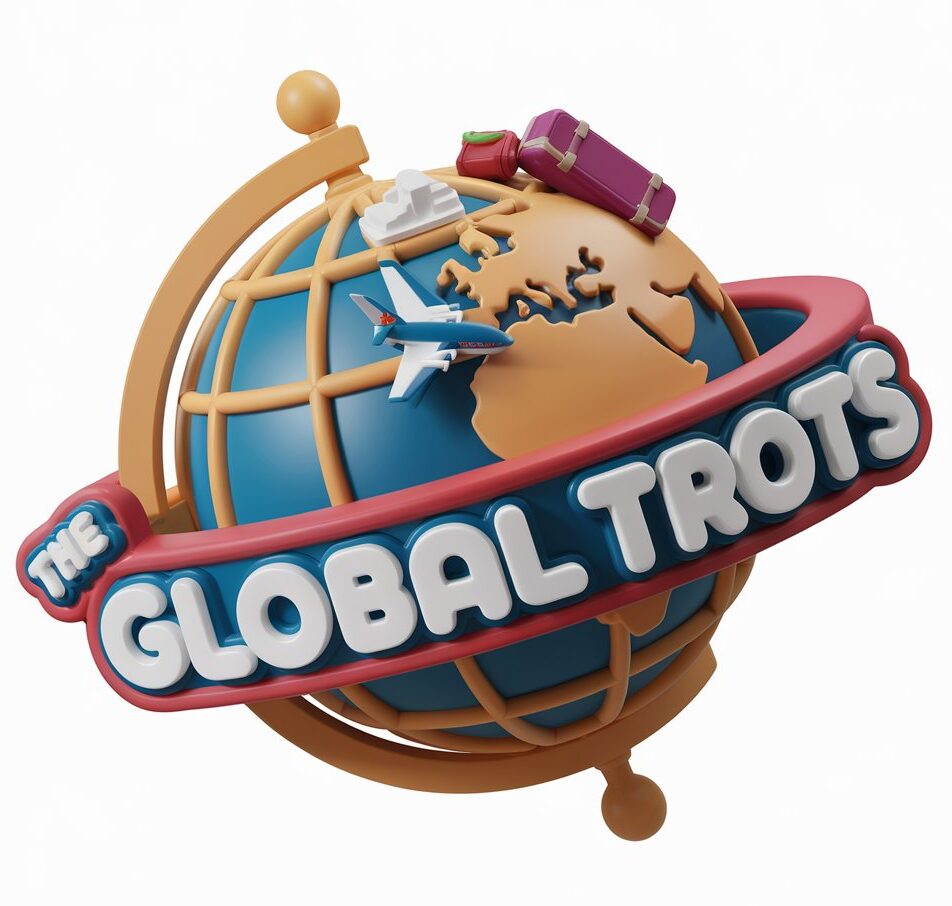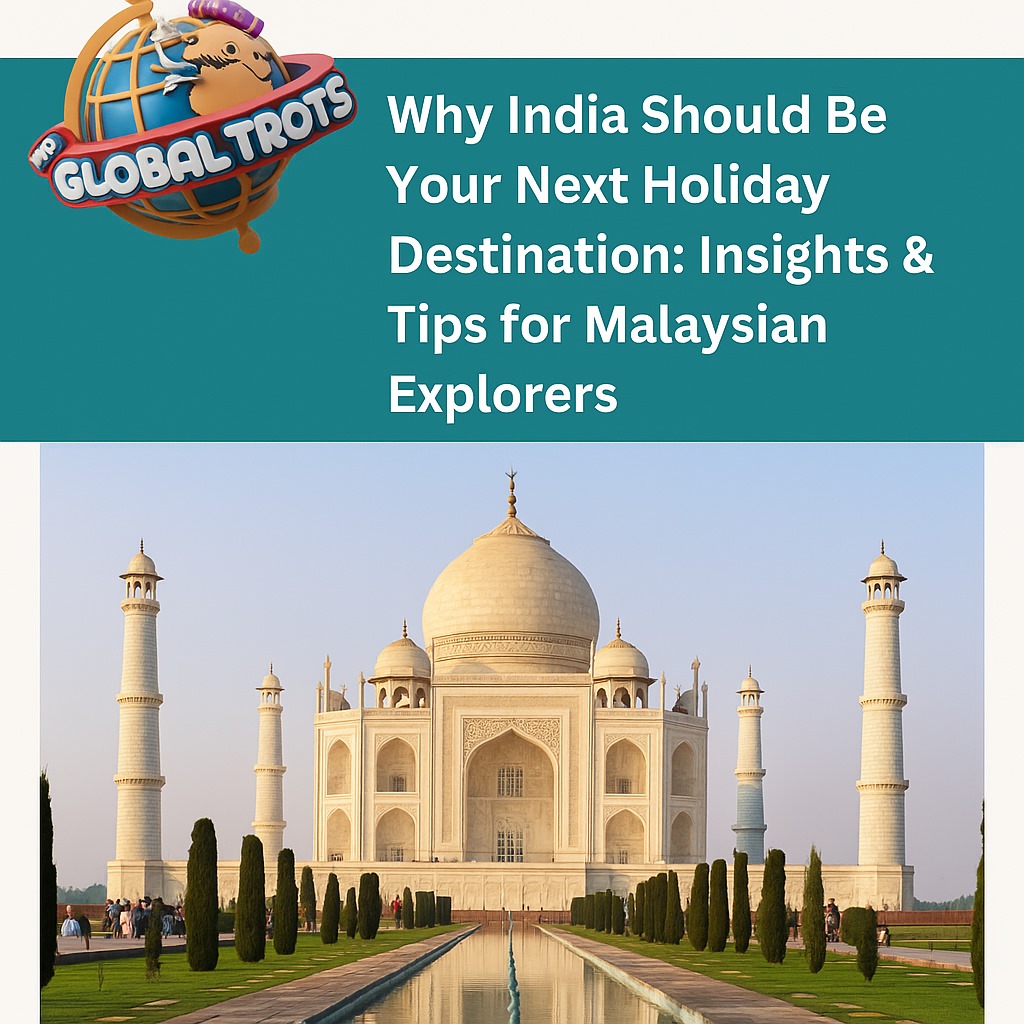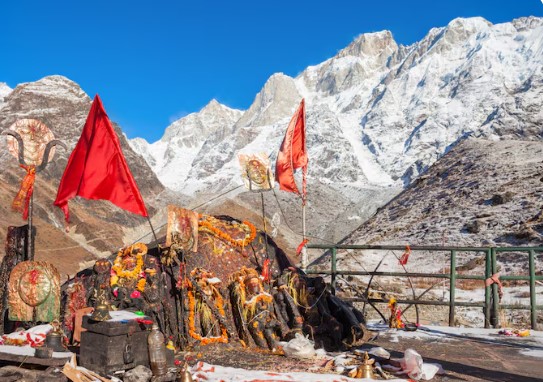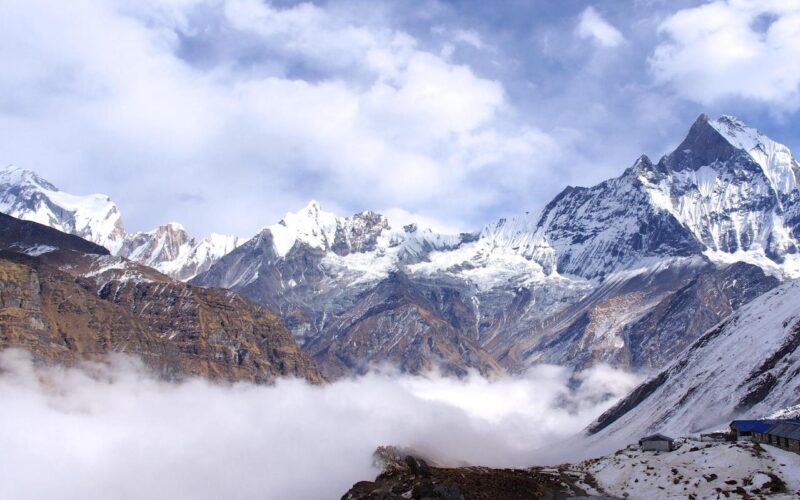India is a land of staggering diversity — in geography, culture, food, heritage, and experiences. For Malaysian travellers looking for something unique, vibrant, and memorable, India offers much more than just a holiday. In this article, we explore in depth why India should be your next holiday destination, and provide practical advice to plan your journey well. We also indicate how working with a travel agency Delhi or an all India travel agency can enhance your experience.
1. What Makes India Uniquely Irresistible
Rich Cultural Tapestry
India’s history stretches back thousands of years, with countless empires, religions, arts, and traditions contributing to a cultural richness unlike almost anywhere else. From Buddhist pilgrims in Bodh Gaya, to the Mughal splendour of Agra and Delhi, the Dravidian temples in the South, tribal cultures in the East, and colonial legacies in the West—the variety is immense.
Natural Diversity
Geographically, India is astonishing: snow-capped Himalayan peaks; arid deserts; tropical beaches; lush forests; tea gardens; river valleys. For Malaysian travellers used to tropical warmth, India offers contrast: cool hill stations, desert landscapes, and alpine trails.
Festivals, Colors & Vibrancy
Festivals such as Diwali, Holi, Durga Puja, Onam, Pongal, Ganesh Chaturthi, and many more are celebrated with grandeur. The visual spectacle, the religious and social importance, the community participation, make India a place that quite literally and figuratively bursts with life.
Value for Experience
Relative to many long-haul destinations, India often yields high “value”—you can enjoy heritage, wildlife, adventure, wellness (like Ayurveda), spirituality, cuisine—often at costs lower than more typical international touristic destinations. When well planned, you get much more for what you spend.
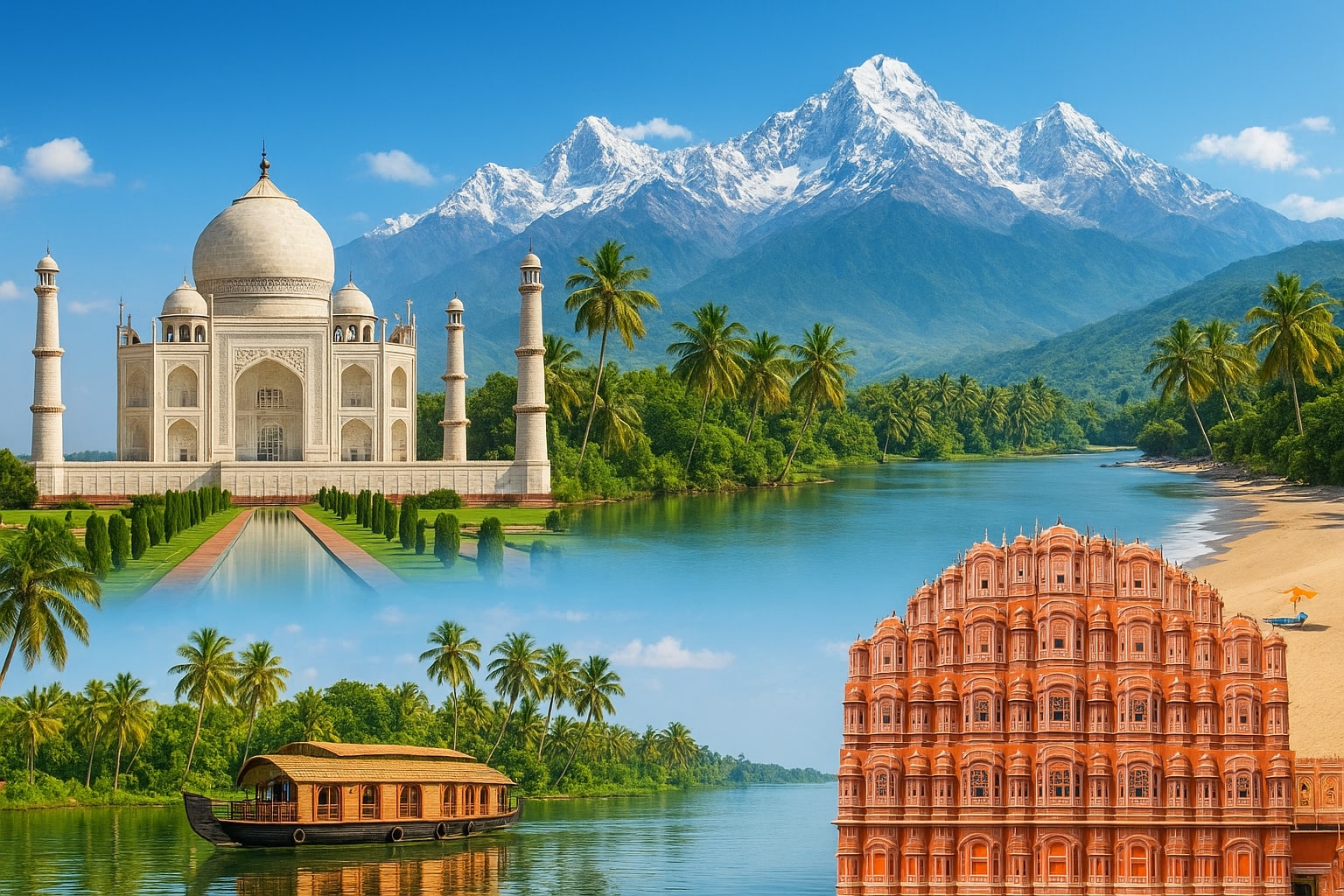
2. Cultural & Food Experiences
Cuisine
India’s cuisine is one of its principal draws. From spicy curries, biryanis, dosas, thalis, sweets like jalebi or gulab jamun, to regional dishes with coconut, mustard, seafood—you’ll find things both familiar and entirely new. Malaysians with Indian heritage will find many resonances, but also many surprises.
Arts, Music, and Craft
India offers classical dance (Bharatanatyam, Kathak, Odissi), folk music, spiritual music (kirtans, qawwalis), crafts (textiles like ikat, block printing, handloom, pottery). Many regions have unique traditions. Exploring these gives deeper insights into local life.
Spiritual & Wellness Journeys
Yoga, meditation retreats (e.g. Rishikesh), Ayurveda in Kerala, pilgrimages – these are well-established and globally sought after. For someone seeking not just sightseeing, but internal rejuvenation, India offers much.
3. Practical Travel Considerations for Malaysians
Visa and Entry Requirements
Malaysians need to check the latest visa policies. Official advisory from the High Commission of Malaysia in New Delhi indicates that you should have proper visa/documentation, passport validity, permits, etc.
Many tourist visas can be applied online (e-visa), simplifying the process. Ensure you have all required health documentation, supporting documents like hotel booking, return flights.
Travel Advisory & Safety
- Stay aware of local travel advisories, especially in sensitive border areas.
- Language: English is widely spoken in tourist zones, though local languages dominate outside. A few phrases in Hindi or regional languages go a long way.
Connectivity & Transport
- India has good air, train, and road networks. Domestic flights can cover long distances quickly.
- Internal transport options: train (including “luxury” and scenic ones), buses, car with driver, or local flights for remote areas.
Accommodation
Many towns, cities offer choices from budget guesthouses and boutique stays to luxury resorts and heritage hotels. South India and hill stations have especially attractive wellness- or nature-oriented stays.
4. How a travel agency Delhi or an all India travel agency Helps
Planning a trip across India’s diversity can be overwhelming. Here’s where a professional travel agency, especially based in Delhi or one that operates as an all India travel agency, adds value:
- Itinerary Customisation: They know the on-ground realities (weather, road closures, regional permissions, festivals), so they can build routes that make sense.
- Transparent Pricing and Local Deals: Local agencies often have good relationships with hotels, transport providers, guides, which can yield better rates.
- Support & Problem-solving: If any issues arise (e.g. with local permits, health, transport delays) having an agency ensures there is someone to assist.
- Cultural Insight: They can arrange local guide-led tours, authentic experiences, not just the tourist highlights.
- Convenience: For Malaysian explorers who may have limited time, letting experts handle bookings, logistics frees up time to enjoy rather than plan.
If you’re travelling from Malaysia, contacting an all India travel agency ensures you can cover multiple states (e.g. Rajasthan, Kerala, Himalayas) under one provider—so coordination is smoother. Meanwhile, a travel agency Delhi will be especially well-placed if your itinerary centres around Delhi, North India, or if you fly into Delhi as a gateway.
5. Budgeting & Accommodation Tips
Budget Categories
- Backpacker / Budget Travel: Hostels, guesthouses, local food, public transport. In many places, daily cost can be quite low.
- Mid-Range Travel: 3-4 star hotels, private transport, mix of domestic flights + road travel.
- Luxury Travel: Heritage palaces, premium resorts, personalized services, fine dining, etc.
Approximate Costs (for Malaysian travellers)
Though costs vary widely, rough comparisons:
- Domestic flights (within India) are often cheaper than international legs, if booked in advance.
- Accommodation: modest hotels in non-metro cities are reasonably priced; hill resorts or luxury stays cost more but offer good value.
- Food: street food and small restaurants are very affordable; fine dining or specialty restaurants cost more.
- Local transport: taxis, ride-share apps in cities; car with driver for inter-city travel. Train travel offers both economy and premium options.
Savings Tips
- Book flights & hotels in advance. Avoid peak festival times (unless you are attending a festival).
- Travel in shoulder seasons when weather is good but tourist volumes are lower.
- Use local markets, local food, avoid imported items.
- Consider group travel packages via an all India travel agency which can often negotiate group discounts.
6. Best Time to Visit India
Timing matters a lot given India’s climate diversity.
| Region | Ideal Time |
| North India (Delhi, Rajasthan, Himalayas) | October to March (pleasant days, cooler evenings) |
| South India (Kerala, Tamil Nadu, Karnataka) | November to March (less rain, comfortable weather) |
| Coastal areas | November to February (avoiding monsoons, high humidity) |
| Hill stations, mountains | April-June (pre-monsoon), September-October as retreat after monsoon |
Avoid heavy monsoon months unless you want the greenery and are prepared.
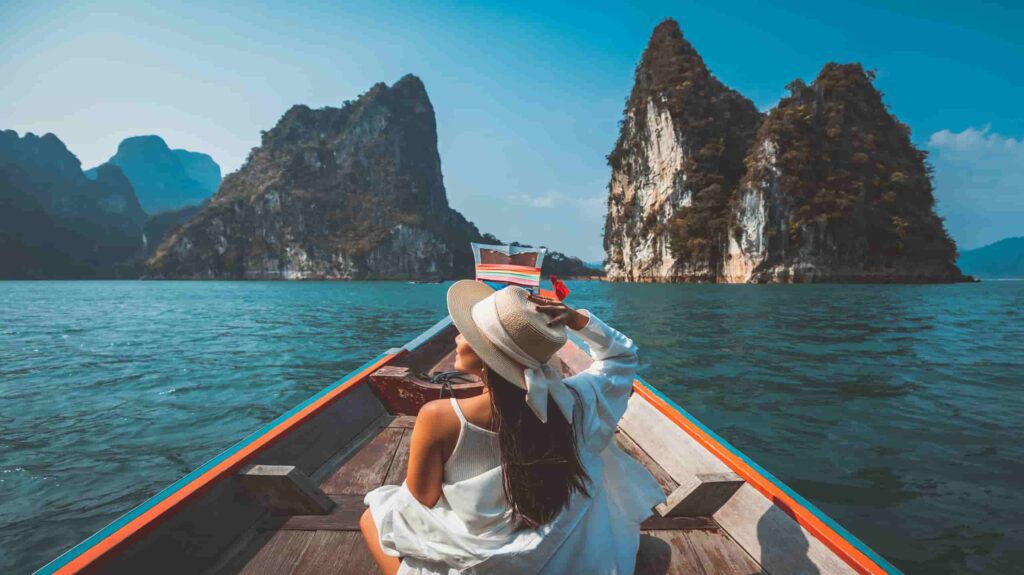
7. Safety, Health & Local Etiquette
- Health: Vaccinations as per requirements. Carry basic medicines. Be careful with water (stick to bottled water if uncertain).
- Hygiene & Food: Start with cooked, hot food. Street food is generally safe in popular tourist areas but exercise caution in remote places.
- Dress & Culture: Especially when visiting religious places, conservative dress is appreciated (cover shoulders, knees). Remove shoes where required. Respect local customs.
- Respectful Interactions: India is diverse; things may be different than in Malaysia. Be patient, polite, and open-minded.
- Security: Keep valuables safe, avoid isolated places at night, use reliable transport. Having a travel agency arrange transfers helps.
FAQs
Q1: Do Malaysians need a visa to visit India?
A: Yes — most Malaysian travellers need a tourist visa for India. However, India offers an e-visa system in many cases. Always check updated rules from Indian immigration authorities. A reliable travel agency Delhi can assist in visa application and documentation.
Q2: Which all India travel agency is best for Malaysians?
A: “Best” depends on your priorities (budget / luxury / adventure / culture). What matters is to check that the agency offers: verified reviews, transparent pricing, local partnerships, good itinerary customisation, and support. Agencies based in Delhi or working nationwide (“all India travel agency”) often have broader reach.
Q3: What is a reasonable budget for a 10-day trip to India from Malaysia?
A: It depends heavily on how you travel (backpacker vs luxury), how many places you cover, and what class of flights and accommodation you choose. As a rough estimate, mid-range might include international flights, domestic flights, 3-4 star hotels, decent meals, transport — prices could vary widely, but moderate budget planning + early booking helps.
Q4: Is India safe for solo female travellers from Malaysia?
A: Many solo female travellers visit India every year safely. As with travel anywhere: plan ahead, stay in trusted accommodations, avoid deserted areas at night, dress respectfully, use reliable local transport, keep emergency contacts handy. Using a travel agency can help with logistics and local information
.Q5: What time of year should Malaysians avoid travelling to India?
A: Monsoon season (roughly June-September depending on region) can bring heavy rains, flooding, travel disruption. Summer in many parts, especially in the north and central India (April-June), leads to intense heat. Very cold winters in Himalayan areas too. Best times are October-March in most places, or tailored per region.
